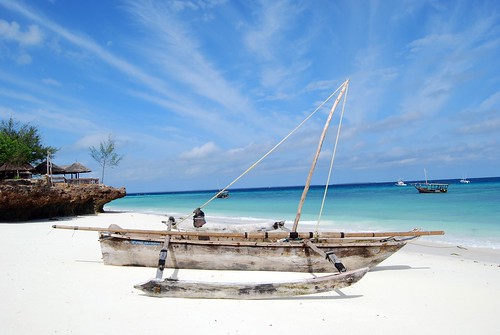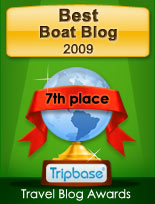Zanzibar-Touched by Tourism
 It’s considered by many to be the number one beach location in East Africa, but we had no idea what we were doing. Sitting in the terminal waiting for my final 30-minute flight to Zanzibar, I thought I would ask someone who might. I targeted two fellow travelers sitting across the room with backpacks at their feet. I took the “maybe we can split a cab” approach, which worked like a charm.
It’s considered by many to be the number one beach location in East Africa, but we had no idea what we were doing. Sitting in the terminal waiting for my final 30-minute flight to Zanzibar, I thought I would ask someone who might. I targeted two fellow travelers sitting across the room with backpacks at their feet. I took the “maybe we can split a cab” approach, which worked like a charm.
The two Amsterdamians had spent the last several months in Africa working at a hospital where they studied medicine as part of their schooling back in home. Not only were they terrifically friendly, they had their stuff together. Dutch friends, Mandi and I split a cab to the Northern part of the island, where we were greeted my another Dutchman who had everything sorted out. We checked in, then over a Tanzanian beer, and under a faded African sky we swapped stories in the cool salty air.
Zanzibar is an island in which the history is as rich as the white sand beaches that separate the turquoise sea from some of the world’s finest spices. Scuba diving, snorkeling, sailing on traditional dhow ships, sampling the spices peppered throughout the island: there are plenty of activities. Or you can simply explore underprivileged alleys, sit with locals over a plate of rice, beans and fish head, and relax on a stunning spread of seaside sand.
 It is an intriguing place, this Zanzibar. Women covered by dark veils expose only their focused eyes and a small section of surrounding skin. Men mend the nets that catch their livelihood. Children play football or practice moves in the sand. The beaches are beautiful. The water clean, clear, and home to small simple sailboats of Arabic decent.
It is an intriguing place, this Zanzibar. Women covered by dark veils expose only their focused eyes and a small section of surrounding skin. Men mend the nets that catch their livelihood. Children play football or practice moves in the sand. The beaches are beautiful. The water clean, clear, and home to small simple sailboats of Arabic decent.
As you sit studying the sails wandering across the water, men young and old pose friendship as they practiced their own form of sales. Trinkets, beads, henna, massage, the offers are endless. We were there in the calm before the storm of tourist season. And as I sat in the sand, a people’s reality became more real.
The seas were soothing, but the air tumultuous. I’ll admit I was slightly spoiled from a Malawian people who earned the title: “friendliest people on earth” ; however, the change here was significant. Anxious to interact, I would offer a Swahili “Jambo” to every passerby, and unless there was something to sell, the few who felt obliged to respond, generally did so unenthusiastically and without eye contact. Whereas, in Malawi I felt welcome even given unearned respect for simple hue of my skin, in Zanzinbar it was quite the opposite. Suddenly white did not mean welcome.
Tourism drives this island. In a land over populated with poverty, a tense dichotomy is born. The people are forced to fight for tourist attention just to feed their families.  Tourists are annoyed by bombardment. Locals irritated, watch at an untouchable distance the frivolity of funds flowing freely from foreigners on the soil of their own paradise.
Tourists are annoyed by bombardment. Locals irritated, watch at an untouchable distance the frivolity of funds flowing freely from foreigners on the soil of their own paradise.
I sat on the other side, hoping reach across the divide. To connect on a level less monetarily based. To connect. To converse. It happened a couple times, but it wasn’t easy. I’m sure it meant more to me then them. I was eager, but I suppose I can understand their excitement to make friends was not so enthusiastic as mine.






2 comments
Uh, did you take all of the pictures on this site? These are incredible.
beautiful piece d, great writing and genuinely quality perceptions
Leave a Comment